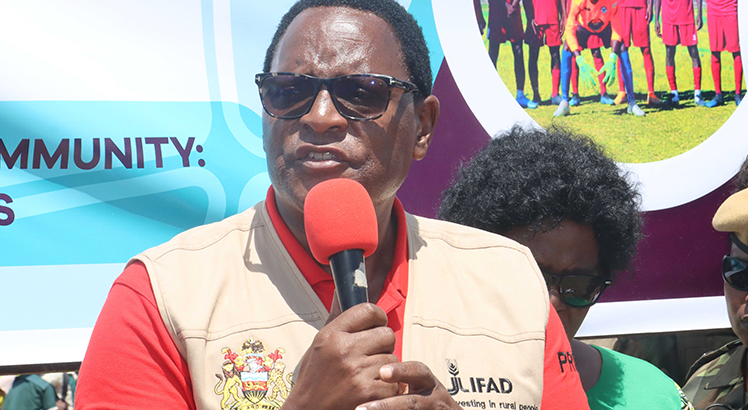Blantyre teams fear for their future

Most Super League teams, in particular those based in Blantyre, are anxious about their future, saying financial constraints are taking the toll on them due to inadequate funding.
In interviews during the week, officials of the teams claim the situation is affecting their performance on the pitch.
Mighty Wanderers, Big Bullets and Azam Tigers were responding to a question on whether the continued dominance by Central Region-based teams is a confirmation that Blantyre teams have lost the grip as the football powerhouse.
Silver Strikers have won the flagship league for three successive seasons while none of the Blantyre-based teams made it into the top five in the just-ended season. Besides, out of the four major competitions, the only team from Blantyre that won silverware last season was Wanderers [Standard Bank Knockout Cup].
Nomads general secretary David Kanyenda, Tigers chairperson Sydney Chikoti and Bullets supporters’ committee secretary Mabvuto Chibambo said it is not surprising that their teams are struggling because the playing field is not level in terms of financial muscle.
Said Kanyenda: “All the top-five teams in the league standings [Silver, Moyale, Mafco, KB and Blue Eagles] are sponsored by government institutions while none from Blantyre enjoys government sponsorship and, therefore, the level of competitiveness cannot be the same.

“Of course, others may argue that we [Wanderers and Bullets] were sponsored by Carlsberg Malawi for the past two seasons, but we were getting K15 million per season when a budget to run a club like Wanderers is K50 million unlike teams sponsored by government institutions which enjoy decent sponsorship and, as a result, their players are motivated.”
The Nomads GS said his team is struggling to settle debts such as monthly upkeeps it owes its players and technical officials.
“We depend on contributions from officials and well-wishers as well as gate collections which are not sufficient considering that most stadiums are owned by government institutions who get quite a substantial amount as gate levy and when you throw in other expenses such as security, cashiers, FAM and Sulom shares, the combined income for the clubs is less than half the gross,” he said.
Kanyenda and Chibambo said with the current difficult economic climate, it is not easy for teams to secure sponsorship from the corporate world and suggested the need for government to create an enabling environment to encourage sponsors to get on board.
“Government should either come up with ways of offering tax waiver to companies that want to sponsor sports or it should encourage its institutions such as statutory corporations to sponsor teams in Blantyre as is the case in Lilongwe. Of course, we appreciate that times are hard, but we are not looking at the whole amount, they could subsidise by providing half the budget,” he said.
Kanyenda said FAM and Sulom are not doing enough to lobby with government being the umbrella bodies.
“They care less about the clubs and yet they expect the national team to do well. A lot of home work needs to be done, regulators should call for a stakeholders meeting to see if these suggestions can be pursued, otherwise at the rate we are going, in the next one to two years another big team will die,” he said.
Kanyenda and Chibambo parried suggestions that teams are struggling because they are not doing enough to run the clubs as commercial entities.
Argued Chibambo: “For a team to operate as a commercial entity, it needs substantial capital. The problem is that we make comparisons with teams from England, Spain and South Africa, but the reality is that we are in different worlds where the economies are very different, even teams such as Manchester United that have global following do not depend on sale of merchandise and membership alone, they also have massive sponsorship.”
However, Chikoti was dimensional in giving his views for Blantyre teams’ struggles.
“Of course, prime is the issue of funding because apart from Epac all the Central Region teams enjoy government sponsorship while most of the Blantyre teams are by and large, funded by well-wishers and so to get the boys [players] motivated, is difficult. They may play for the love of the game, but in the end they depend on football for their livelihood.
“The other factor is that the two big teams [Wanderers and Bullets] have been consistent failures in the recent past, they haven’t lived to their status largely because of poor management.
“On the other hand, smaller teams such as [Tigers and Blantyre United] have been reduced to being breeding grounds for the so called big guns who have turned into ‘predators’—pouncing on the small teams and getting players without paying a tambala. A good example is the players that Wanderers and Bullets got from us and Blantyre United respectively and Sulom were toothless and could not protect the small teams. It takes three years to groom a player and it is frustrating for others just to come and reap where they did now sow. So, this in a way also affected the performance of the teams,” said Chikoti.
And unlike Bullets and Wanderers, the Tigers boss said government needs to be commended for the role it is playing by sponsoring teams.
“Of course, the corporate world should have come in to complement government’s efforts, but considering the current economy and the management style of the teams, they are reluctant to open their cheques. So, this can be food for thought,” he said.
Renowned soccer analyst Charles Nyirenda said Blantyre teams have lost grip due to lack of funding and poor management.
“Sound financial backing and team management are very critical in determining performance of the team because it enables good planning and acquisition of quality players,” said Nyirenda.
FAM president Walter Nyamilandu said: “If there was an opportunity to convince government to consider creating a conducive environment for the corporate world to sponsor football, we definitely would pursue that, but we also have to blame ourselves for not safeguarding sponsorship.
“As an association, we did find a sponsor [Carlsberg] for Wanderers and Bullets, but they pulled out within two years because we didn’t safeguard it. So, we need to put our houses in order before we can think of approaching the corporate world. There are a lot of well-wishers, but they are let down by the way our clubs operate.”
Youth Development and Sports Minister Enoch Chihana said government is ready to meet stakeholders and listen to their suggestions.
“If a meeting can be arranged, then we are ready to hear their views and if they are viable, we can pursue them.
“However, government can consider the issue of sponsoring as a social responsibility and not necessarily offering tax waiver because it is an issue that would require wide consultations as there are a lot of factors that have to be looked into,” said Chihana.





